- Regulatory Status
- RUO
- Other Names
- Cytotoxic T-lymphocyte protein 4, Ctla4, CTLA-4, Cytotoxic T-lymphocyte-associated antigen 4, CD152, Ly-56
- Ave. Rating
- Submit a Review
- Product Citations
- publications
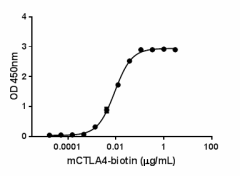
-

When mouse CD86 (Cat. No. 771702) is immobilized at 1.0 µg/mL, Mouse CTLA-4-Fc Chimera Biotinylated Protein binds with an EC50 of 5 - 20 ng/mL. -
Stability testing for Mouse CTLA4-biotin. Mouse CTLA-4-Fc Chimera Biotinylated Protein was aliquoted in PBS, pH 7.2, 5% glycerol at 0.2 mg/mL. One aliquot was frozen and thawed four times (4x Freeze/Thaws), and compared to a control kept at 4°C (Control). The samples were tested for their ability to bind immobilized mouse CD86 (Cat. No. 771702).
Mouse CTLA-4 was initially identified by differential screening of a murine cytolitic cDNA library. It is a member of the IgG superfamily, and it encodes a 223 amino acid protein and possesses a single extracellular V domain, a transmembrane domain, and a cytoplasmic domain. CTLA-4 is ~30% homologous with CD28, and both bind to the same ligands (B7.1/CD80 and B7.2/CD86) although CTLA-4 binds with higher affinity than CD28. Parallel recognition of a specific MHC-peptide complex by the T-cell receptor and CD80 or CD86 by the costimulatory receptor CD28 results in T cell activation, cytokine production, proliferation, and differentiation. After the T cells' activation process and upregulation of CTLA-4, co-ligation of the TCR to MHC-peptide complex and CTLA-4 to its ligands results in cell cycle arrest and the end to T cell activation. It has been suggested that the negative regulatory mechanism of CTLA-4 is mediated through trans-endocytosis of CD80 and CD86 (capture of ligands from opposing cells). The ligands are removed from the original cell and degraded inside of CTLA-4-expressing cells. As a result, the action of CD28 is impaired. Alternative splice variants of CTLA-4 have been described in mice and humans; these variants skip exon 2 (ligand-binding domain) or exon 3 (transmembrane domain). The ligand independent CTLA-4 is expressed in mice, but not in humans, and the soluble CTLA-4 (sCTLA-4) is expressed in mice and humans. CTLA-4 is constitutively expressed by Tregs, and they are an important source of sCTLA-4. It has been suggested that sCTLA-4 potentiates regulatory T cell function. High levels of sCTLA-4 in Tregs have been associated with type 1 diabetes (T1D) and other autoimmune diseases.
Product DetailsProduct Details
- Source
- Mouse CTLA-4, amino acids Ala37-Phe162 (Accession# AAH42741), with a C-terminal human IgG1 Fc and a 6His-tag was expressed in CHO cells.
- Molecular Mass
- The unlabeled 366 amino acid recombinant protein has a predicted molecular mass of approximately 41 kD. The DTT-reduced and non-reduced glycosylated proteins migrate at approximately 55 kD and 110 kD respectively by SDS-PAGE. The predicted N-terminal amino acid is Ala.
- Purity
- > 95%, as determined by Coomassie stained SDS-PAGE.
- Formulation
- 0.22 μm filtered protein solution is in PBS, pH 7.2, 5% glycerol.
- Endotoxin Level
- Less than 0.1 EU per µg protein as determined by the LAL method.
- Concentration
- 10 and 25 µg sizes are bottled at 200 µg/mL. 100 µg size and larger sizes are lot-specific and bottled at the concentration indicated on the vial. To obtain lot-specific concentration and expiration, please enter the lot number in our Certificate of Analysis online tool.
- Storage & Handling
- Unopened vial can be stored between 2°C and 8°C for one month, at -20°C for six months, or at -70°C for one year. For maximum results, quick spin vial prior to opening. The protein can be aliquoted and stored at -20°C to -70°C. Stock solutions can also be prepared at 50-100 µg/mL in sterile buffer (PBS, HPBS, DPBS, or EBSS) containing carrier protein such as 0.2-1% BSA or HSA and stored in working aliquots at -20°C to -70°C. Avoid repeated freeze/thaw cycles.
- Activity
- When mouse B7-2/CD86 (Cat. No. 771702) is immobilized at 1.0 µg/mL, mouse CTLA-4-Fc Chimera Biotinylated Protein binds with EC50 of 5 - 20 ng/mL. HRP Avidin (Cat. No. 405103) was used to detect the binding.
- Application
-
Bioassay
- Application Notes
-
BioLegend carrier-free recombinant proteins provided in liquid format are shipped on blue ice. Our comparison testing data indicates that when handled and stored as recommended, the liquid format has equal or better stability and shelf-life compared to commercially available lyophilized proteins after reconstitution. Our liquid proteins are verified in-house to maintain activity after shipping on blue ice and are backed by our 100% satisfaction guarantee. If you have any concerns, contact us at tech@biolegend.com.
Antigen Details
- Structure
- Disulfide-linked homodimer, biotinylated via amines
- Distribution
-
Activated T cells, CD4, CD8, and Tregs
- Function
- Inhibits T cell activation by reducing IL-2 production and IL-2R expression, also arresting T cells in G1 phase of the cell cycle; protects against the development of autoimmunity.
- Interaction
- Antigen presenting cells, B cells
- Ligand/Receptor
- CD80 (B7.1), CD86 (B7.2)
- Bioactivity
- Measured by its ability to bind mouse CD86
- Cell Type
- B cells, T cells, Tregs
- Biology Area
- Immunology, Inhibitory Molecules
- Molecular Family
- CD Molecules, Immune Checkpoint Receptors, Soluble Receptors
- Gene ID
- 12477 View all products for this Gene ID
- UniProt
- View information about CTLA-4 on UniProt.org
 Login / Register
Login / Register 











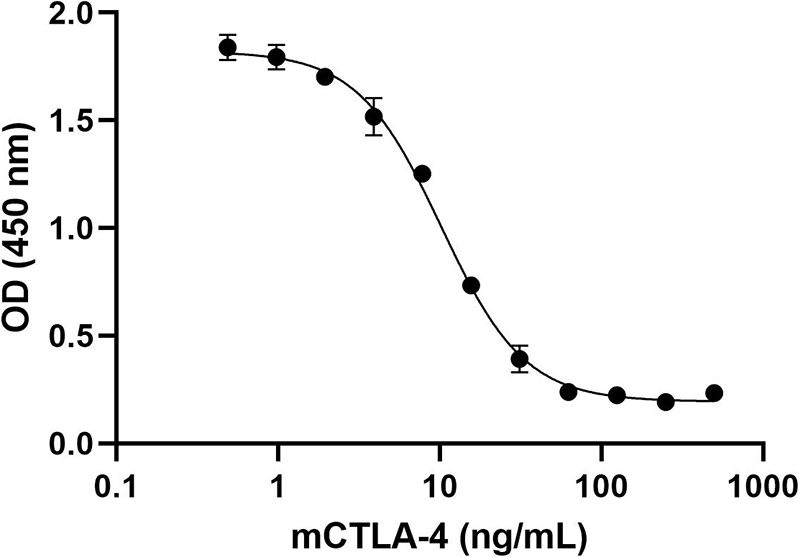
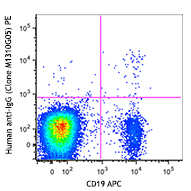
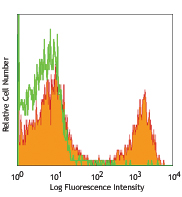
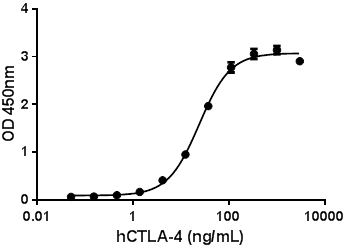



Follow Us